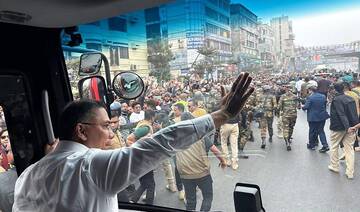STOCKHOLM: Swedish climate activist Greta Thunberg on Friday labelled Donald Trump the “more dangerous” option in next week’s US presidential election but slammed the incumbent administration for its support of Israel.
With the United States heading to the polls on November 5, the 21-year-old activist said in a post on X that it was “probably impossible to overestimate the consequences this specific election will have for the world and for the future of humanity.”
“There is no doubt that one of the candidates — Trump — is way more dangerous than the other,” Thunberg said.
But she also slammed sitting President Joe Biden and Vice President Kamala Harris — who is running against former president Donald Trump — for their backing of Israel and its offensive in Gaza.
“Let’s not forget that the genocide in Palestine is happening under the Biden and Harris administration, with American money and complicity,” Thunberg said.
“It is not in any way ‘feminist’, ‘progressive’ or ‘humanitarian’ to bomb innocent children and civilians — it is the opposite, even if it is a woman in charge.”
Hamas’s Oct. 7 attack on Israel last year triggered the war in Gaza and resulted in 1,206 deaths, mostly civilians, according to an AFP tally of Israeli official figures.
Israel’s retaliatory bombardment and ground war have killed at least 43,259 Palestinians in Gaza, a majority of them civilians, according to data from the Hamas-run territory’s health ministry.
The United Nations considers these figures to be reliable.
Thunberg urged Americans to go beyond exercising their right to vote and take direct action such as protests and boycotts against the “catastrophic consequences of American imperialism.”
“My main message to Americans is to remember that you cannot only settle for the least worst option,” Thunberg said.
Greta Thunberg says Trump ‘more dangerous’ but blasts Harris on Gaza
https://arab.news/p5h4v
Greta Thunberg says Trump ‘more dangerous’ but blasts Harris on Gaza

- Thunberg urged Americans to go beyond exercising their right to vote and take direct action
Bangladesh’s religio-political party open to unity govt

- Opinion polls suggest that Jamaat-e-Islami will finish a close second to the Bangladesh Nationalist Party in the first election it has contested in nearly 17 years
DHAKA: A once-banned Bangladeshi religio-political party, poised for its strongest electoral showing in February’s parliamentary vote, is open to joining a unity government and has held talks with several parties, its chief said.
Opinion polls suggest that Jamaat-e-Islami will finish a close second to the Bangladesh Nationalist Party in the first election it has contested in nearly 17 years as it marks a return to mainstream politics in the predominantly Muslim nation of 175 million.
Jamaat last held power between 2001 and 2006 as a junior coalition partner with the BNP and is open to working with it again.
“We want to see a stable nation for at least five years. If the parties come together, we’ll run the government together,” Jamaat chief Shafiqur Rahman said in an interview at his office in a residential area in Dhaka, days after the party created a buzz by securing a tie-up with a Gen-Z party.
Rahman said anti-corruption must be a shared agenda for any unity government.
The prime minister will come from the party winning the most seats in the Feb. 12 election, he added. If Jamaat wins the most seats, the party will decide whether he himself would be a candidate, Rahman said.
The party’s resurgence follows the ousting of long-time Prime Minister Sheikh Hasina in a youth-led uprising in August 2024.
Rahman said Hasina’s continued stay in India after fleeing Dhaka was a concern, as ties between the two countries have hit their lowest point in decades since her downfall.
Asked about Jamaat’s historical closeness to Pakistan, Rahman said: “We maintain relations in a balanced way with all.”
He said any government that includes Jamaat would “not feel comfortable” with President Mohammed Shahabuddin, who was elected unopposed with the Awami League’s backing in 2023.














